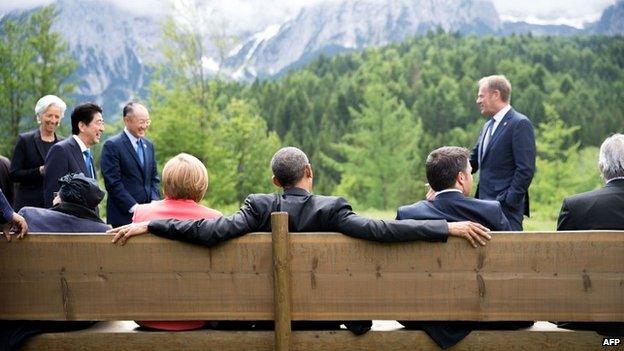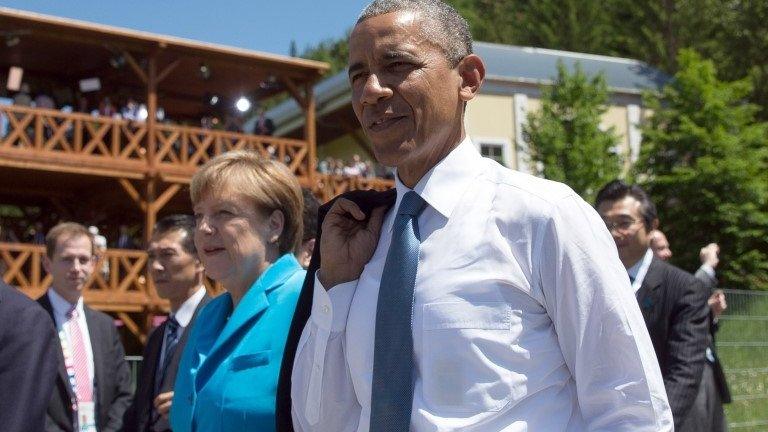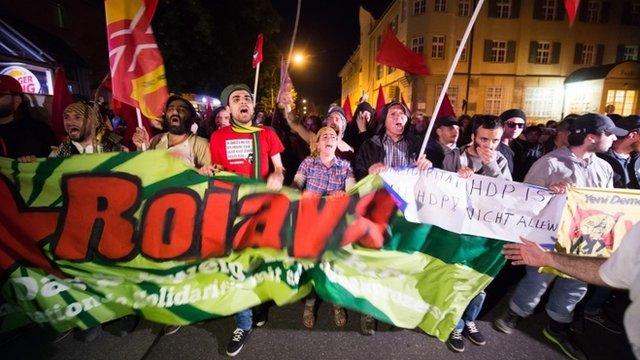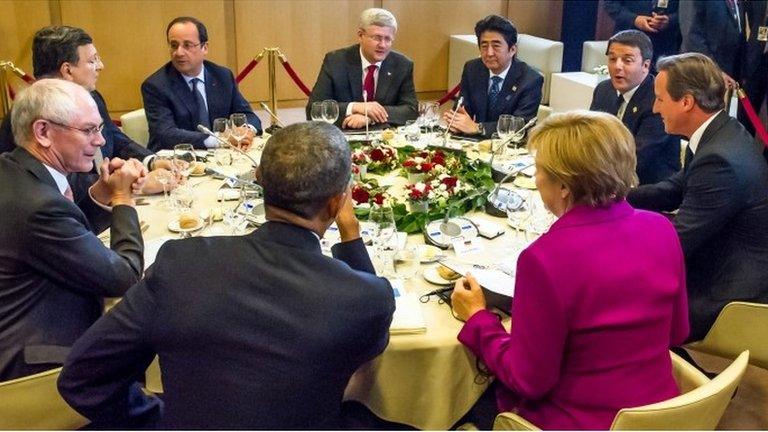G7 summit: Merkel says time is running out for Greece deal
- Published
Angela Merkel: "Greece will have to implement measures"
German Chancellor Angela Merkel has warned that time is running out for a deal to keep Greece in the eurozone.
Speaking after the G7 summit in Germany, she said Europe would show solidarity but only if Greece "makes proposals and implements reforms".
Earlier, Greek Finance Minister Yanis Varoufakis said it was time to stop finger-pointing and find an agreement.
Other topics on the agenda at the G7 summit were climate change, countering extremism and the war in Ukraine.
It was held at the picturesque Schloss Elmau hotel in the Bavarian Alps and was attended by the leaders of the US, UK, Japan, France, Canada and Italy.

The summit is being held at the Schloss Elmau resort in the Bavarian Alps
Ms Merkel, who hosted the event, said the Greek crisis had been a central part of discussions.
She reiterated her desire for Greece to remain part of the eurozone, but said: "There isn't much time left. Everyone is working intensively. Every day counts now."
The European Commission is asking for further reforms to Greece's economy, including tax increases and cuts in civil servants' salaries and pensions, before the next €7.2bn (£5.2bn) tranche of bailout money can be released.

Greece debt talks - main sticking points
International creditors want pension cuts, slimmer civil service, VAT reform, fewer tax rebates and more private sector investment, reports say
Mr Tsipras has ruled out increased VAT on energy and reduced supplementary payments for poorer pensioners
Athens wants lower primary budget surplus targets, but both sides appear close to agreement. According to reports, creditors want a budget surplus of 1% of GDP this year and 2% next, while Greece has proposed 0.8% for 2015 and 1.5% for 2016

But Greece has robustly rejected these proposals without some form of debt restructuring agreement in return.
At the weekend, Mr Varoufakis was quoted as saying the Commission's latest demands were "borderline insulting".
But speaking on a visit to the German capital Berlin on Monday, he told reporters: "It is time to stop pointing fingers at one another and it is time that we do our job... to come to an agreement."
Ms Merkel is expected to meet with Greek Prime Minister Alexis Tsipras on the sidelines of a European Union-Latin America summit in Brussels on Wednesday.
Russia sanctions
The G7 also called for the decarbonisation of the global economy, pledging to move electricity generation towards renewable sources and nuclear by 2050.
However they stopped short of setting binding targets.

Roger Harrabin, BBC environment analyst
The G7 has called for a transformation of electricity generation towards renewables and nuclear by 2050. And they said fossil fuel should not be burned in any sector of the economy by the end of the century.
The world's leaders have effectively signalled the end of the fossil fuel era that has driven economies since the Industrial Revolution.
This is a seismic shift. But huge questions remain.
Some scientists and environmentalists accused the G7 of reckless complacency by suggesting that we can afford to burn fossil fuels at all past 2050.

On Ukraine, Ms Merkel said G7 countries hoped Russia would comply with a ceasefire agreement signed in February by pro-Moscow rebels and the Kiev government. But she added that sanctions could be strengthened if necessary.
US President Barack Obama echoed her comments, saying: "The G7 is making it clear that if necessary we stand ready to impose additional significant sanctions against Russia."
He added that Russian President Vladimir Putin must decide whether he still wants to wreck Russia's economy in pursuit of a "wrongheaded desire to recreate the glories of the Soviet empire".
Russia was excluded from the group of economic powers last year after Russia annexed Crimea.
- Published7 June 2015

- Published6 June 2015

- Published4 June 2014
